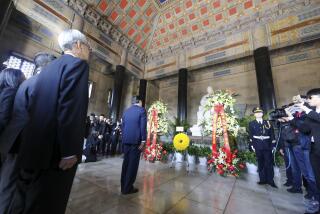Koizumi Makes Low-Key Visit to War Shrine
- Share via
TOKYO — In a visit that took just a minute but may have repercussions far into the future, Prime Minister Junichiro Koizumi defied critics and prayed this morning at Tokyo’s contentious Yasukuni Shrine, which honors the souls of the country’s 2.5 million war dead, including 14 convicted war criminals from Japan’s imperial era.
With police helicopters overhead and bodyguards clearing his path, Koizumi strode briskly to the Shinto shrine’s outside altar where the public gathers to pray. He bowed, ascended the steps and made an offering of coins before clasping his hands in prayer.
His visit stopped short of Yasukuni’s inner courtyard, which he has entered on four occasions since becoming prime minister in April 2001. In the past, he used the shrine’s official entrance and signed the guest book as “Prime Minister.”
This appearance seemed designed to strike a more accommodating tone with those critics at home and abroad who have urged him to stay away from the nationalist shrine. Koizumi wore a gray business suit instead of a morning coat or kimono as he has in the past. He did not sign the registry.
The effect was to make the visit seem less formal and conform to Japan’s constitutional separation of religion and politics. Two weeks ago, a Japanese High Court ruled that Koizumi’s previous visits to Yasukuni had been unconstitutional because he attended a religious institution in a clearly official capacity.
On Monday, the prime minister encountered a lone protester, and was politely applauded by a group of mostly middle-aged Japanese visitors.
The low-key appearance may not be enough to mollify those who see any affiliation with Yasukuni as an endorsement of its nationalist trappings. Shintoism was the state religion during Japan’s imperial era, when its military invaded and occupied huge swaths of Asia. The Yasukuni grounds in central Tokyo include a museum devoted to glorifying Japanese militarism as a noble cause that tried to liberate Asia.
China has criticized the visits, which have hurt Japan’s international image at a time when the two countries are competing for influence and natural resources in Asia. Chinese leaders have repeatedly warned Koizumi that the visits to Yasukuni are an obstacle to better relations.
But Koizumi’s government sees Chinese criticism as a self-serving attempt by Beijing to demonize Japan, without acknowledging the bloody history of the Chinese Communist Party.
Japanese opinion has hardened, with a growing sense here that foreign governments have no business dictating how Japan mourns its war dead.
*
Hisako Ueno of The Times’ Tokyo Bureau contributed to this report.
More to Read
Sign up for Essential California
The most important California stories and recommendations in your inbox every morning.
You may occasionally receive promotional content from the Los Angeles Times.













